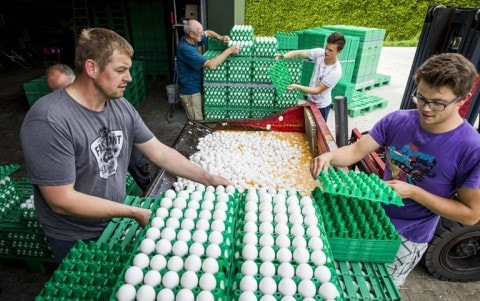Dirty egg crisis in European countries
After the Netherlands, Belgium, Germany, Sweden and Switzerland, France and the UK are the latest two countries to be affected by the pesticide-tainted egg crisis.
The UK Food Safety Authority said yesterday that although the number of imported eggs was very limited (about 21,000) and the risk to public health was low, the country was also speeding up investigations into the distribution of imported eggs, as well as recalling related products.
 |
| Dutch farmers destroy eggs suspected of being contaminated. Photo: Reuters |
On the same day, the French Ministry of Agriculture said that 13 batches of eggs suspected of being contaminated, imported from the Netherlands in July, had been shipped to food processing companies in the west of the country. Investigations are underway to assess the situation (related products and the destination of these eggs) and recall related products for analysis.
The “dirty” egg scandal broke last week in the Netherlands after authorities there discovered high residues of the pesticide fipronil in samples of feces, blood and eggs. This is a chemical commonly used in the agricultural industry to control pests on plants, but is banned for use in treating animals for human food.
According to the World Health Organization (WHO), high levels of the toxic substance fipronil can cause damage to the liver, thyroid, and kidneys if ingested in large amounts over time.
Dutch authorities immediately shut down 180 suspected farms, destroyed and recalled large quantities of hens and eggs from stores and warehouses, and said it was difficult to determine whether the “tainted” eggs were sold to consumers at that time. The crisis then spread to Germany, Switzerland and Sweden. Tens of millions of eggs were recalled and destroyed.
“Even if we consider that an acute health risk is unlikely, the illegal use of the insecticide fipronil in laying hens is unacceptable. This practice must stop immediately,” said German Agriculture Minister Christian Schmidt.
Some Dutch farmers affected by the crisis have begun culling their birds. According to the Dutch Agricultural Organization, more than 300,000 contaminated chickens, all in their egg-laying stages but removed from the processing and distribution chain by the crisis, have been culled. Millions of other egg-laying hens are at risk if farmers believe they are no longer profitable due to a lack of markets.
Egg shelves in many Dutch supermarkets have been reduced and even empty following the recall. The Dutch agricultural sector has estimated the damage caused by the “tainted” egg scandal to run into millions of euros and the government yesterday pledged an emergency relief plan.
Representatives of affected farms in the Netherlands, Belgium and Germany have previously asked for compensation once responsibility is established. These farms all said they used the services of the Dutch-based farm disinfection company ChickFriend, which is suspected of fraudulently using Fipronil in an anti-parasitic product called DEGA 16.
German Agriculture Minister Christian Schmidt said: “The German government has detected the insecticide fipronil in some poultry products, a chemical banned for the treatment of food animals in Europe.
According to what we know now, this poisoning is due to the farms using a parasitic drug called Dega 16. This is a completely herbal drug and has been approved, but it seems that the ingredient Fipronil, which is banned for use in poultry and livestock, has been added.
The Netherlands and Belgium have also opened criminal investigations into the case. According to European media, another supplier, Poultry-Vision of Belgium, is also under investigation, having purchased large quantities of fipronil from Romania.
In Belgium alone, 51 suspected farms were closed today, of which 22 were breeding chickens. Of these, 21 farms were found to have residues of the pesticide Fipronil in the feces, blood and eggs of chickens, but much lower than the regulations of the European Union, as well as the Belgian Food Safety Authority.
Last weekend, the agency admitted that it had discovered the fipronil problem in poultry farming in June, but only informed neighboring countries on July 20 due to requirements for “secrecy of investigations.” In response to criticism, especially from Germany, the Belgian Ministry of Agriculture has asked the country’s Food Safety Authority to submit a report on the incident and pledged to be as transparent as possible./.
According to VOV
| RELATED NEWS |
|---|
